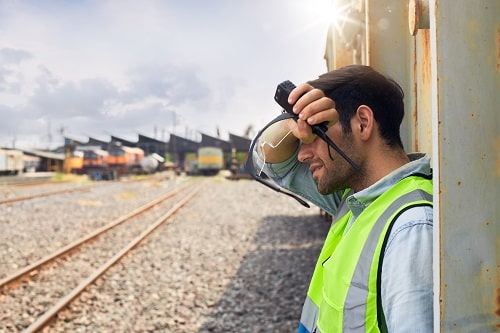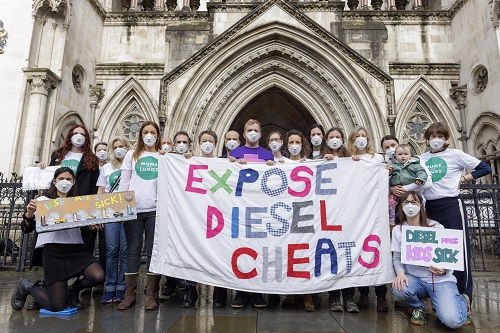Nobody should be exposed to unsafe levels of air pollution. Everyone has the right to breathe clean air – whether it’s at home or at work.
Opinion
Outdoor workers count the all-too high cost of air pollution
The scale is dramatic: air pollution contributes to up to 43,000 early deaths¹ each year and more than three million additional working days are lost annually in the UK due to staff absences².
The health cost of toxic air runs into the tens of billions with the House of Commons Environmental Audit Committee estimating the total cost potentially ranging between £9 billion and £20 billion every year³. That’s staggering.
 Photograph: iStock/oversnap
Photograph: iStock/oversnap
It doesn’t stop there. Air pollution takes a heavy toll on worker productivity to the tune of a £2.7 billion loss to the UK economy⁴. The numbers are huge: the health and economic argument for cleaning the air is truly compelling. It’s a double whammy on workers and employers alike. Road pollution and pollution from construction projects accounts for a huge chunk of the UK’s poor air quality.
Many cities in the UK currently breach World Health Organization (WHO) legal safe limits of air quality – ensuring our air quality meets these guidelines will mean better public health and in turn reduce workplace absences and productivity losses caused by air pollution. That is the future we must strive for.
Outdoor workers vulnerable to air pollution
Too many workers are left vulnerable to the health impacts of air pollution simply because their line of work means they spend most of their day outside. Over an estimated three million Brits work outdoors⁵ – in a wide range of vital jobs ranging from construction workers, street cleaners, refuse collectors, delivery drivers and cyclists to maintenance workers, engineers, traffic police and street vendors. Whatever your trade, earning a living should never compromise your health.
Asthma + Lung UK regularly hears from people with lung conditions across the UK who say that air pollution makes their symptoms worse. People with such conditions can experience inflammation of the airways, causing coughing and the terrifying feeling of breathlessness. They can also suffer from potentially life-threatening asthma attacks and flare ups of chronic obstructive pulmonary disease (COPD).
The British Safety Council’s own ‘Time to Breathe’ campaign shows that outdoor workers in London are consistently exposed to unsafe levels of air pollution⁶. Astonishingly, in some places, this can be as much as 60 per cent above WHO guidelines. WHO is increasingly concerned about the impact and recently made the link between outdoor working (proximity to busy roads) and increased cardiovascular and respiratory risks from exposure to air pollution⁷.
Make the transition to cleaner modes of transport
At Asthma + Lung UK, we are fighting for everyone’s right to breathe clean air. That’s why we’re calling on political parties to commit to a national programme for those who need it most to transition to cleaner modes of transport through a targeted scrappage scheme. Clean air zones are one of the most effective ways to reduce air pollution fast. Through our scheme, we’re asking government to set out more support to local authorities, so they can implement clean air zones fairly, and are better placed to aid communities through the transition.
We know significant and unacceptable levels of exposure to air pollution happen at work, especially for those based outdoors. While there is no silver bullet to tackling air pollution, a joined-up public health approach focused on reducing the number of cars on the road will make a difference. National and local policymakers need to put a holistic mix of policies in place to supercharge the pace of cleaning up our air.
 Sarah Woolnough is chief executive of Asthma + Lung UK. Photograph: Asthma + Lung UK
Sarah Woolnough is chief executive of Asthma + Lung UK. Photograph: Asthma + Lung UK
The charity coordinates the Healthy Air Coalition (HAC), which is a collective of leading health, environment and transport organisations, who share the vision of a UK free from toxic air. Targeted action to reduce pollution from high-polluting sectors, such as agriculture and industry, is one of the HAC’s areas of focus. These two sectors combined produce over 45 per cent of the UK’s current total emissions⁸. Working together with a range of organisations across sectors, we are calling for policy change that addresses the practices of our biggest polluters and their impact on public health.
HSE ‘could do more’ on occupational exposure to air pollution
When it comes to workplace safety, Asthma + Lung UK urges the Health and Safety Executive (HSE) to do more to recognise exposure to air pollution as an occupational health issue and to identify outdoor workers as a vulnerable group. The scale of the problem is such that it needs to be urgently addressed by employers, industry bodies and unions.
Protecting workers from the impact of air pollution is a key part of our collective mission. Thousands of people are joining us in the fight for clean air and you too can join that fight by signing our online petition calling on policymakers to take urgent and bold action. Together, we can make our voices heard on an issue that affects us all.
Sarah Woolnough is chief executive of Asthma + Lung UK.
Sign up here:
Asthma + Lung UK Clean air petition
References
- UK Health Security Agency (2022). Chemical Hazards and Poisons Report Issue 28 – June 2022 Reducing health harms associated with air pollution, Chemical hazards and poisons report: issue 28 (cleanair.london) p15
- Clean Air Fund, cleanairfund.org/news-item/can-we-put-a-price-on-clean-air-yes-we-can/
- PHE (2018) Health matters: air pollution, gov.uk/government/publications/health-matters-air-pollution/health-matters-air-pollution
- DEFRA (2014) Valuing the Impacts of Air Quality on Productivity, uk-air.defra.gov.uk/library/reports?report_id=832
- ONS ons.gov.uk/employmentandlabourmarket/peopleinwork/employmentandemployeetypes/datasets/workforcejobsbyindustryjobs02
- British Safety Council (2020) Time to Breathe, britsafe.org/campaigns-policy/time-to-breathe-air-pollution-campaign/research-the-case-for-action/
- WHO (2013) Review of evidence on health aspects of air pollution, apps.who.int/iris/handle/10665/341712
- Defra gov.uk/government/statistical-data-sets/env01-emissions-of-air-pollutants
OPINION

Heat at work: a silent killer
By Halshka Graczyk and Lacye Groening, ILO on 07 April 2025
Workers across the world are increasingly being exposed to excessive heat with serious implications for their safety and health. It is therefore vital that governments, employers and workers’ organisations develop, share and implement practical and low-cost strategies and measures for effectively reducing the risk from heat stress at work.

Making good work the foundation
By Mike Robinson FCA, British Safety Council on 07 April 2025
In 2024, for the first time, the UK dropped out of the list of the top 20 happiest countries: according to the World Happiness Index. This year, the UK rests in 23rd place, slightly ahead of the US and behind the Nordic countries, Germany, the UAE and others.

The air we share: why tackling pollution protects us all
By Scott Paul, Mums for Lungs on 04 April 2025
Air pollution is often invisible; its impact is anything but. Whether you’re a parent worried about your child’s lungs, a construction worker breathing exhaust fumes, or a commuter passing through busy streets, polluted air is everyone’s problem.



